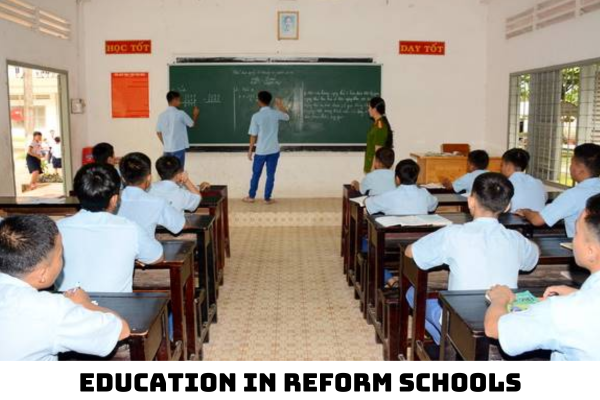Vietnam: What is the definition of education in reform schools? What are the procedures for taking education in reform schools?
What is the definition of education in reform schools in Vietnam?
Pursuant to the provisions of Article 96 of the 2015 Criminal Code as follows:
Education in reform schools
1. The court may subject a juvenile offender to compulsory education in reform schools for 01 - 02 years if the criminal act is considered serious or the measure is necessary because of his/her record or living environment.
2. The person sent to a reform school must fulfill his/her study and work duties under the supervision of the institution.
Thus, education in reform schools is regulated under the Criminal Code and applies to persons from full 14 years old to under 18 years old who commit crimes, according to the order and procedures prescribed by the Criminal Procedure Code.
Thus, the court may subject a juvenile offender to compulsory education in reform schools if the criminal act is considered serious or the measure is necessary because of his/her record or living environment.
What are the procedures for taking education in reform schools in Vietnam?
Pursuant to the provisions of Article 430 of the 2015 Criminal Procedure Code, the procedures for taking education in reform schools in Vietnam are as follows:
- The trial panel, when considering penalties not necessary, shall sentence the offender under 18 to education in a reform school.
- A decision to implement education in a reform school has these primary details:
+ Number, issue date, and issuing place of the decision;
+ Full name and signatures of members of the Trial panel issuing the decision;
+ Reasons and grounds of the decision;
+ Full name, date of birth and residential address of the suspect or defendant;
+ Offence title, applicable points, sections and articles from the Criminal Code;
+ Length of time of education remedy in the reform school;
+ Responsibilities of the reform school that educates the remedied person.
- The decision to implement this remedy shall be immediately given to the offenders under 18, their parents or representatives, and the reform school.

What are the regulations on the diet of students at reform schools in Vietnam?
Based on the provisions of Article 28 of Decree 133/2020/ND-CP, students are guaranteed the standards for quantitative food each month by the State, including:
+ 17 kg of plain rice;
+ 1.2 kg of pork;
+ 1.2 kg of fish;
+ 0.5 kg of sugar;
+ 0.75 liters of fish sauce;
+ 0.1 kg of monosodium glutamate;
+ 0.5 kg of salt;
+ 15 kg of greens;
+ 0.2 liters of cooking oil;
+ Other seasonings equivalent to 0.5 kg of plain rice;
+ Fuel equivalent to 17 kg of firewood or 15 kg of coal.
Food and fuel ensure quality and have an average price according to the local market price.
Students' diets during holidays and Tet shall comply with the provisions of law and Clause 1, Article 149 of the Law on the Execution of Criminal Judgments in 2019.
Reform school principals can swap the amount of food mentioned above to suit the reality to ensure that students eat up to the standard of eating. The principal of the reform school shall decide on the diet for sick and sick students on the basis of the proposal of health workers, but the total quantification of the diet must not exceed 02 times the standard daily meal.
What are the medical care policies for students at reform schools in Vietnam?
Pursuant to the provisions of Article 29 of Decree 133/2020/ND-CP, the medical care policies for students at reform schools in Vietnam are specified as follows:
- Students who come to the reform school shall be examined and made health monitoring forms. During the period when students comply with educational justice measures at reformatories or reformatories, based on the specific situation of the unit organizing general health examinations for students, at least every 06 months, specifically: Measuring height, weight, average chest circumference, Check the parameters of heart rate, blood pressure, body temperature, comprehensive physical examination according to specialties. The cost of periodic health check-ups for students is paid according to the price bracket prescribed by the Ministry of Health.
reform schools regularly take measures to prevent and control epidemics; implement measures for drug rehabilitation, infection prevention and treatment of HIV/AIDS and infectious diseases for students. The health examination for students is based on the conditions and time of observance of the decision to be admitted to the reform school, the specific situation of each reform school, and the results in the record to manage and monitor the health of students. The usual medical treatment fee for students is equivalent to 04 kg of tedious rice/student/month.
- In case a student becomes seriously ill beyond the treatment capacity of the school infirmary, he or she shall be transferred to the district or provincial health facility where the reform school is located for treatment.
Within 07 days from the date of sending the student to the upper level for treatment, the principal of the reform school must report to the Director of the Police Department in charge of the prison, compulsory education institution, or reform school and notify the student's parent or guardian, coordinate with the school in caring for and treating. Diets, drug distribution, and fostering for students shall be prescribed by health facilities.
- During the period of treatment at a specialized medical institution where the student expires to comply with the educational measure at the reform school, the principal of the reform school must issue a certificate of completion of the educational justice measure at the reform school.
- The State's health facilities shall coordinate with reform schools in their localities in organizing medical examination and treatment for students; build or arrange separate areas and rooms for medical examination and treatment for students and duty rooms of managers in accordance with the conditions of health facilities.
- The above medical costs are allocated by the state budget. Unless the student's relative or legal representative voluntarily pays for medical treatment.
LawNet





